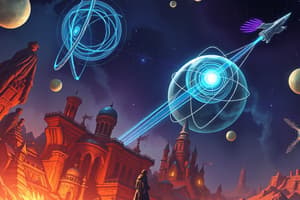Podcast
Questions and Answers
Why is it important to study the historical development of science and technology in the world?
Why is it important to study the historical development of science and technology in the world?
To understand how social considerations changed the course of science and technology.
What are the features and remarkable characteristics of the ten identified stages in the historical development of science and technology?
What are the features and remarkable characteristics of the ten identified stages in the historical development of science and technology?
Each stage represents significant advancements and changes in perspective from 0 BCE to the present.
What are the contributions of Copernicus, Darwin, and Freud in the philosophy of science?
What are the contributions of Copernicus, Darwin, and Freud in the philosophy of science?
They all contributed to the scientific revolution by challenging established beliefs.
How is the scientific revolution done in various parts of the world like Latin America, East Asia, the Middle East, and Africa?
How is the scientific revolution done in various parts of the world like Latin America, East Asia, the Middle East, and Africa?
What are the roles of science and technology in Philippine nation-building?
What are the roles of science and technology in Philippine nation-building?
What are government policies pertaining to science and technology in terms of their contributions to nation-building?
What are government policies pertaining to science and technology in terms of their contributions to nation-building?
What are the actual science and technology policies of the government and how do they impact the development of the Filipino nation?
What are the actual science and technology policies of the government and how do they impact the development of the Filipino nation?
What is the role of indigenous knowledge in the development of indigenous science?
What is the role of indigenous knowledge in the development of indigenous science?
Which of these eras corresponds to the rise of modern science and technology?
Which of these eras corresponds to the rise of modern science and technology?
Which statement correctly defines the Scientific Method?
Which statement correctly defines the Scientific Method?
Flashcards are hidden until you start studying
Study Notes
General Concept & Historical Development
- Examines the historical links between social factors and advancements in science and technology.
- Aims to enhance critical thinking and creativity through activities and exercises.
- Highlights the influence of scientific ideas on societal development.
- Discusses the role of science and technology in transforming societies, particularly in the Philippines.
- Evaluates government initiatives aimed at enhancing the country's scientific and technological capabilities.
- Includes a focus on indigenous science and technology.
Intended Learning Outcomes
- Understand the historical interactions between science, technology, and society.
- Analyze how scientific and technological advancements influence societal changes and environmental conditions.
- Identify key paradigm shifts throughout history.
- Articulate the transformative effects of science and technology on society.
- Explore the contributions of science and technology to nation-building in the Philippines.
- Assess government policies related to science and technology and their impact on national development.
- Recognize specific science and technology policies and evaluate their effects on Filipino development.
Targets/Objectives
- Trace the evolution of science and technology from Ancient to Modern Ages.
- Appreciate significant scientific advancements over time.
- Discuss contributions of thinkers like Copernicus, Darwin, and Freud to scientific discourse.
- Analyze examples of scientific revolutions across different global regions (Latin America, East Asia, Middle East, Africa).
- Evaluate how science and technology influence Philippine nation-building efforts.
- Review governmental policies on science and technology regarding their role in national development.
- Assess the impact of existing government science and technology policies on the Filipino nation.
Student Learning Strategies
- Engage in online discussions (synchronous/asynchronous) and face-to-face sessions.
- Participate actively in the Learning Management System (LMS) discussions for additional participation scores.
Lecture Guide Overview
- History of Science and Technology:
- Before Scientists (up to 599 BCE): Overview of early human understanding and tools.
- Antiquity (600 BCE - 529 CE): Significant developments in ancient civilizations.
- Medieval Era (530 - 1452): Technological advancements during the Middle Ages.
- Renaissance & Scientific Revolution (1453 - 1659): Birth of modern scientific thought and methodology.
- Scientific Method (1660 - 1734): Emergence of measurement and experimentation.
- Enlightenment & Industrial Revolution (1735 - 1819): Shift towards industrialization and technological progress.
- 19th Century (1820 - 1894): Growth of modern scientific theories and practices.
- Rise of Modern Science (1895 - 1945): Establishment of contemporary scientific disciplines.
- Big Science & Post-Industrial Society (1946 - 1972): Expansion of large-scale scientific projects.
- Information Age (1973 - 2003): Transformation brought by digital technology and information dissemination.
Historical Periods in Science and Technology
- Each historical era showcases unique characteristics and advancements.
- The Stone Age marks the earliest human technological progress, like the construction of structures such as Stonehenge.
Key Questions for Reflection
- Importance of studying the historical progression of science and technology.
- Features of significant historical stages of development from 0 BCE to the present.
- Philosophical impacts of thinkers like Copernicus, Darwin, and Freud.
- Variations of scientific revolutions across different global regions.
- Role of science and technology in the context of Philippine development.
- Evaluation and impact of government science and technology policies.
- Significance of indigenous knowledge in the development of indigenous science.
Studying That Suits You
Use AI to generate personalized quizzes and flashcards to suit your learning preferences.




